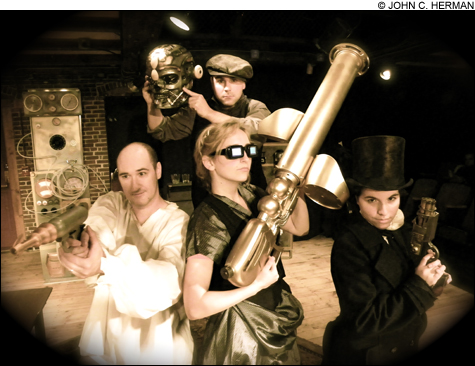
TO A FUTURE DARKLY Steampunk views of what might be. |
Since they began gaining mass popularity in the '80s, the antique copper laser-guns, cog-studded corsets and alternate electronic empires of the steampunk genre have been buzzing the cultural circuitry ever more. The aesthetic, which conjures a fictional vision of the future as if seen from the era of steam power and Victorian outfits, originated in association with the cyberpunk movement, and its influence is now seen everywhere from movies and graphic novels to high fashion. This month, brand new steampunk creations take the stage both literally and virtually, via Steampunk and Robot Theatre, a series of short plays about the ye-olde future, produced by John Herman: 17 plays, along with art and music, are licensed for free use under Creative Commons at johnherman.org/blog, and the in-the-flesh component of nine plays and live electronic music appears at the Players' Ring, in Portsmouth.
The intimate 19th-century Ring theater is beautifully suited to bring us back to a time between the Industrial Revolution and the widespread introduction of electricity, and Sean O'Connell's set props look great against the brick and hardwood of the space. There are colorful circuit boards in wooden casings, a tall case of glass-faced analogue gauges, and a cryptic wired device flashing next to a cut-glass decanter of whiskey. And as overture and between-scene atmospherics, Gen-Y musicians the Attic Bits, in vests outfitted with halogen bulbs, manipulate hand-held controllers to hack into 1980s video game sounds, thereby making surprisingly sublime music.
The nine retro tales and parables themselves, written and directed by a variety of artists (including director Tara McDonough, of Portland), range fairly widely in style, theme, and sophistication. Some take up the traditional dystopian tropes of the steampunk and cyberpunk genres: In Jessa Rowan's Unplugged (directed by Herman), which opens the show, we watch a couple and their daughter at the "dinner" table, each connected by clear tubing to a control panel. The father, we learn, is the remorseful inventor of a way to soothe post-traumatic emotions via electricity, which has instead become a way to keep the population subdued.
Less darkly dramatic is G.E. Rock and the Telectoscopic Transmission, by Phil Kliger (also directed by Herman). This short play goes high-camp on the evil-scientist routine (Laura Thomas as the over-the-top Dr. G.E. Rock), with hyperbolic antics and awesome brass ray-guns.
Another, David Mauriello's Dead Ringer, feels like a stretch for inclusion in the evening — though Emily Briand's Chloe is fetchingly gotten up in a corset, the main connection to the genre is a tricked-out cell phone by which a possibly not-dead buried man may or may not be able to reach his adulterous widow and best friend. It becomes mainly a vehicle for ironic turns and a wealth of references to the dead man's erectile gifts.
Best are the plays that use the conventions and trappings of the genre to create new contexts for universal, timeless concerns or complaints. In the deliciously scripted family dysfunction of Jon Frazier's Ro-Bro, a human brother and sister (Paul Anthony Hartwell and wonderfully Brit-bitchy Liz O'Connell) bicker viciously with their robot "brother" (Shawn Crapo) over slights and favoritism, to the near-orgasmic delight of their therapist (Chuck Galle, who also directs).